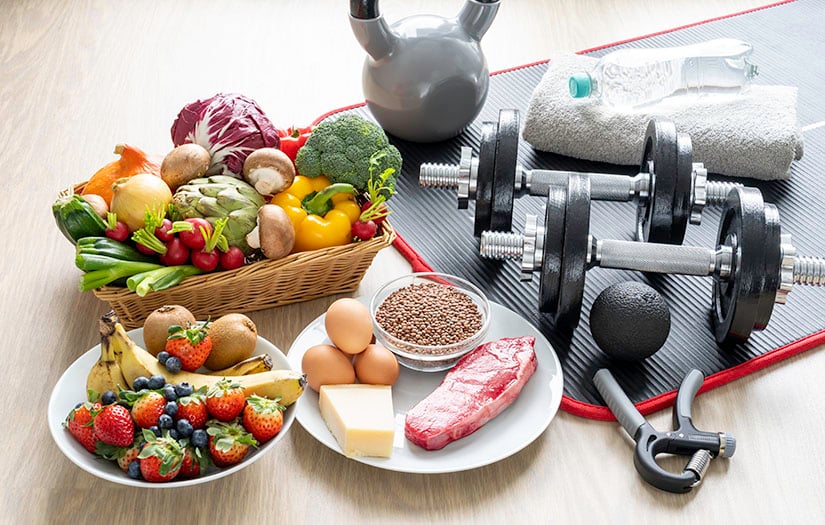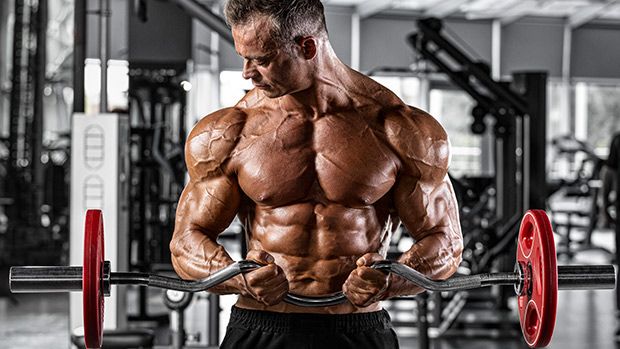Fueling the fire within – Nutrition and Training for Professional Athletes
Have you ever wondered what it takes to be at the top of your game? How professional athletes perform at such exceptional levels, pushing their bodies beyond limits most of us can only dream of? The answer lies in a carefully crafted combination of nutrition and training.
For professional athletes, proper nutrition is not just about eating well; it’s about providing their bodies with the fuel they need to excel. It’s about optimizing performance, enhancing recovery, and maintaining peak physical condition. And when paired with tailored training regimes, these athletes become unstoppable forces on the field or court.
In this blog post, we will explore the crucial role that nutrition plays in athletic performance. We’ll delve into macronutrient ratios for a balanced diet and uncover how post-workout recovery nourishes tired muscles. Additionally, we’ll take a deep dive into different training regimes designed specifically for various types of athletes.
Whether you’re an endurance athlete seeking stamina that defies boundaries or a powerlifter aiming to conquer new heights, this article has got you covered. We’ve also included sample training plans to help guide your journey towards greatness.
But wait! That’s not all! To further optimize your performance potential, we’ll provide recommendations on supplements that can give you an extra edge – pushing your capabilities to unimaginable heights!
So strap in as we embark on this exhilarating adventure into the world where sweat meets science – where dedication meets discipline – where champions are made through unwavering commitment to both nutrition and training regimes! Together, let’s unlock the secrets behind reaching new peaks in athletic excellence.
The Importance of Proper Nutrition for Athletic Performance
Proper nutrition plays a critical role in optimizing athletic performance. Athletes need to fuel their bodies with the right nutrients to perform at their best on the field, track, or court. But why is nutrition so important? Well, let’s break it down.
First and foremost, proper nutrition provides athletes with the energy they need to train and compete at high levels. Carbohydrates are especially crucial as they serve as the body’s primary source of fuel during intense physical activity. Including complex carbohydrates like whole grains and fruits in your diet can help sustain energy levels throughout your training sessions or games.
Next up are proteins – essential for muscle repair and growth. Athletes often put significant stress on their muscles through intense training regimes, so consuming enough protein is vital for recovery and preventing muscle breakdown. Lean sources like chicken breast or tofu should be incorporated into meals along with plant-based options such as legumes or quinoa.
Don’t forget about healthy fats! They may have gotten a bad rap in the past, but they’re actually beneficial for athletes too. Healthy fats provide long-lasting energy, support brain function, and aid in nutrient absorption. Avocados, nuts, seeds, and fatty fish are excellent sources of these good-for-you fats.
Vitamins and minerals also play an integral part in athletic performance by supporting various bodily functions such as immune health, bone strength, and oxygen transport. A well-rounded diet that includes plenty of fruits and vegetables will supply athletes with a wide range of micronutrients necessary for optimal performance.
Hydration is another key aspect of proper nutrition that shouldn’t be overlooked by athletes. Staying hydrated before workouts helps maintain fluid balance within the body while replacing fluids lost through sweat during exercise is crucial to avoid dehydration.
Balanced Diet for Athletes: Macronutrient Ratios
When it comes to fueling their bodies for optimal performance, professional athletes understand the importance of a balanced diet. But what exactly does that mean? One key aspect is getting the right macronutrient ratios.
Carbohydrates are an essential component of an athlete’s diet as they provide energy for intense workouts and help replenish glycogen stores. Whole grains, fruits, and vegetables should be prioritized to ensure a steady release of energy throughout the day.
Protein plays a crucial role in muscle repair and growth. Lean sources such as chicken breast, fish, tofu, and legumes are excellent options for athletes looking to meet their protein needs.
Healthy fats shouldn’t be neglected either. They aid in hormone production and can reduce inflammation in the body. Avocados, nuts, seeds, and olive oil are all great sources of healthy fats that athletes can incorporate into their diets.
Finding the right balance between these macronutrients is key for achieving peak performance. While there isn’t a one-size-fits-all approach when it comes to ratios, generally speaking, athletes should aim for around 45-65% of calories from carbohydrates, 10-35% from protein, and 20-35% from fat.
It’s important to note that individual needs may vary based on factors such as sport type or intensity level. Consulting with a sports nutritionist can help determine personalized macronutrient ratios tailored specifically to each athlete’s goals and requirements.
Remember that no matter how dedicated you are in your training regime if your diet falls short on providing the necessary nutrients you won’t reach your full potential! So take charge of what you put into your body because after all – you truly are what you eat!
Post-Workout Recovery: What to Eat and Drink
Proper post-workout recovery is crucial for professional athletes to optimize their performance and minimize the risk of injuries. After an intense training session or competition, it’s important to refuel your body with the right nutrients to promote muscle repair and replenish energy stores.
One key aspect of post-workout nutrition is consuming a combination of protein and carbohydrates. Protein helps in repairing damaged muscles, while carbohydrates aid in replenishing glycogen levels. Opt for lean sources of protein such as chicken, fish, or tofu, along with complex carbohydrates like whole grains, fruits, and vegetables.
In addition to protein and carbs, hydration plays a vital role in recovery. Replenishing fluids lost through sweat is essential for maintaining optimal performance. Water should be your go-to choice but adding electrolytes can also be beneficial – sports drinks or coconut water are good options.
Timing matters too! Aim to consume a balanced meal within 45 minutes after exercising. This window allows your body to efficiently absorb nutrients when your muscles are most receptive.
Don’t forget about rest! Getting enough sleep helps facilitate proper recovery by allowing your body time to repair itself. So make sure you prioritize getting quality Zzzs!
Remember that individual nutritional needs vary based on factors like sport type and intensity level. It’s always best to consult with a registered dietitian or sports nutritionist who can tailor specific recommendations based on your unique needs.
Training Regimes for Different Types of Athletes
Every athlete is unique, with specific goals and needs. That’s why training regimes should be tailored to suit each individual. Depending on the sport and desired outcome, different types of athletes require specific training approaches.
Endurance athletes, such as marathon runners or cyclists, focus on building stamina and cardiovascular capacity. Their training regime typically includes long-distance runs or rides at a moderate intensity. They may also incorporate interval training to improve speed and endurance.
Strength athletes, like powerlifters or weightlifters, prioritize building muscle mass and strength. Their training regime consists of heavy resistance exercises like squats, deadlifts, and bench presses. They often follow a split routine that targets specific muscle groups on different days.
Power athletes in sports like sprinting or jumping need explosive strength and speed. Their training regime includes plyometric exercises such as box jumps or medicine ball throws to enhance power output. They may also incorporate Olympic lifts like cleans or snatches for full-body explosiveness.
Agility-based sports require quick reflexes and coordination. Athletes participating in sports like soccer or basketball benefit from agility-focused drills such as ladder work or shuttle runs.
In combat sports like boxing or mixed martial arts (MMA), fighters need a combination of various skills including strength, endurance, agility, and technique. Training regimes involve a mix of cardio workouts, strength conditioning exercises, sparring sessions for technique development,
Adapting the right regimen according to an athlete’s goals can make all the difference in their performance on game day! So whether you’re an endurance runner looking to conquer your next race or a powerlifter aiming for new personal records – remember that customized training will help you reach your full potential!
Sample Training Plans for Endurance, Strength, and Power Athletes
Endurance athletes require a training plan that focuses on building stamina and cardiovascular fitness. These athletes engage in activities like long-distance running or cycling. A sample training plan for endurance athletes may include regular long-distance runs or rides to improve aerobic capacity. Interval training sessions can also be incorporated to enhance speed and endurance.
Strength athletes, such as weightlifters or powerlifters, need a different approach to their training regime. Their goal is to build muscle mass and increase overall strength. A typical training plan for strength athletes might involve heavy weightlifting exercises like squats, deadlifts, and bench presses performed with low repetitions but high intensity.
Power athletes, such as sprinters or throwers, focus on explosive movements and maximum force production. Their training plan would typically involve plyometric exercises like box jumps or medicine ball throws to improve power output. They may also incorporate sprint intervals into their routine to enhance speed.
It’s important for each athlete to work with a qualified coach or trainer who can customize the training plans according to individual goals and capabilities. By following these specific plans tailored for endurance, strength, or power development respectively; professional athletes can optimize their performance potential.
Supplement Recommendations for Optimal Performance
In addition to following a balanced diet and training regime, professional athletes often turn to supplements to enhance their performance. While it’s important to note that supplements are not a substitute for proper nutrition and training, they can provide an added boost when used correctly.
Here are some supplement recommendations for optimal performance:
Protein Powder: Protein is essential for muscle repair and growth. Athletes can benefit from consuming protein powder post-workout or as a convenient snack throughout the day.
Creatine: Creatine has been shown to improve strength and power output during high-intensity exercise. It helps replenish ATP stores in muscles, allowing athletes to maintain intensity during workouts or competitions.
Omega-3 Fatty Acids: These healthy fats have anti-inflammatory properties that aid in recovery from intense training sessions or injuries. Fish oil supplements are a popular source of omega-3s for athletes.
Vitamin D: Adequate vitamin D levels are crucial for bone health, immune function, and overall athletic performance. Since most people don’t get enough sunlight exposure, supplementation may be necessary, especially during the winter months.
Caffeine: Caffeine has been shown to improve endurance, focus, and alertness during exercise by stimulating the central nervous system.
It’s important to consult with a sports nutritionist or healthcare provider before incorporating any new supplements into your routine as individual needs may vary based on factors such as sport type, training volume/intensity, body composition goals, and personal preferences.
Remember that while supplements can offer benefits when used appropriately, they should never replace whole foods in your diet plan.
By combining proper nutrition with effective training regimes tailored specifically to their respective sports, professional athletes can maximize their performance potential and achieve their goals.




